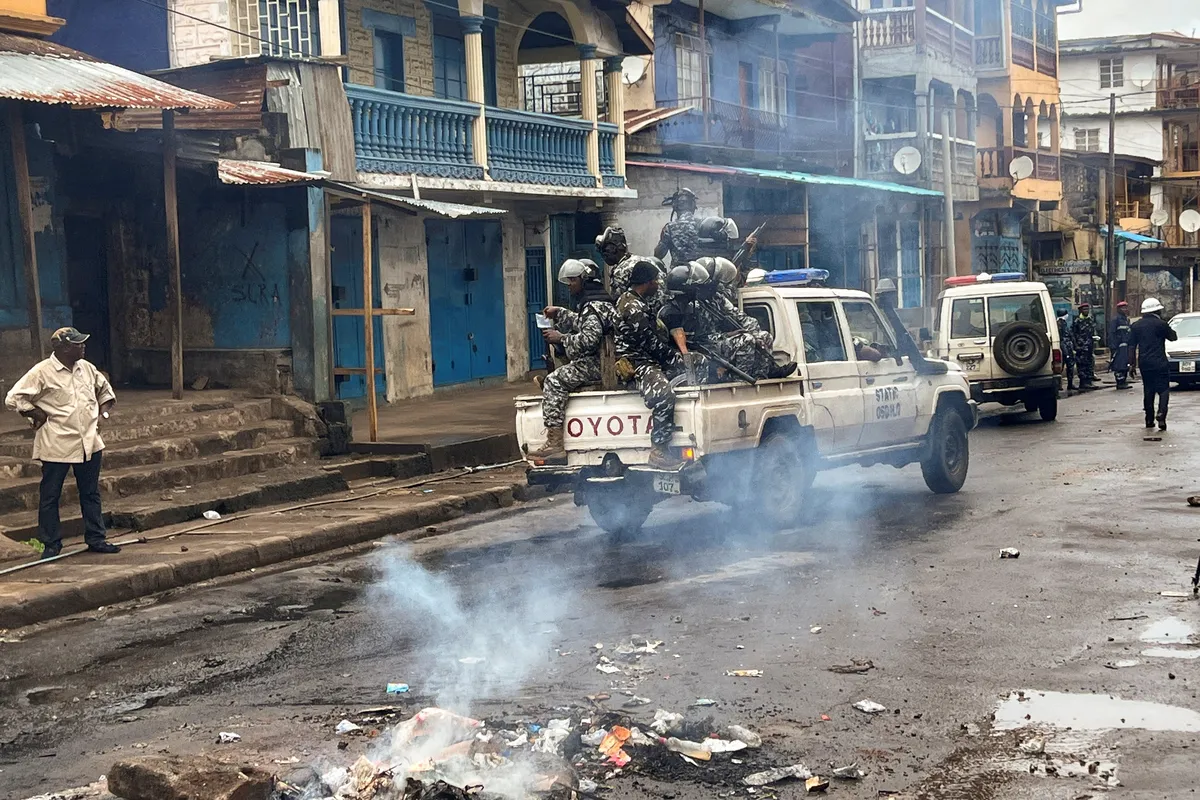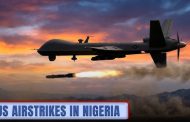Reports from Sierra Leone is indicating colossal failure in handling the revolt that jolted the country, Africa and the world all of last week. Well located sources and major global media outlets are in consensus that the regime is merely identifying and arresting those who can be called ringleaders of the uprising, beating some of them to death.
In other words, they are not as bothered about the social context of the uprising involving variables such as the cost of living nightmare, the diaspora factor, the increasingly difficult global scene and the global crisis of democracy.

President Julius Mada Bio of Sierra Leone
There are no pictorial or graphic evidence to prove the claim of failure at the moment but not only has President Julius Mada Bio framed the eruption as terrorism thereby permitting the use of counter-terrorism tactics, there are hardly even implicit admission of the social roots of the violence which the government neither foresaw nor appear to see any solution than old style police tactics of containing opposition through arrest and detention. Meanwhile, such discretionary use of coercive instruments is one of the grudges cited by the protesters, the other major one being the impossible cost of living.
Yet others are the youth bulge and the influence of the diaspora population said to have articulated the ‘Mada Bio must go’ slogan which animated the revolt but which must have so irritated the president. Each of three persons who appeared on Aljazeera programme – Inside Story – on the revolt in Sierra Leone emphasised these two variables but not the government.
This phase of the popular assertion in Sierra Leone, therefore, takes the world back to the unique hypersensitivity of the typical African president – military or civilian – to being challenged. Historically, they all see popular protests as challenge to their person and their authority. In fact, chief Olusegun Obasanjo, a two-time president of Nigeria wrote long ago that Africa doesn’t have a word in the languages which has the same meaning as opposition. The attitude might, on the other hand, have links to the father-figure conception of the leader across much of Africa but it would be an interesting research question if leaders who are stealing people’s wealth and behaving generally like brigands can claim such heritage.
Some commentators on the unfolding situation in Sierra Leone argue the necessity for show of force to suppress the uprising but nobody argues that such annuls the imperative for a more inclusive framing of the crisis and the use of backchannels to reach out to those the government might call troublemakers. As the argument goes, to call them trouble makers without asking why they are making trouble is neither adequate nor acceptable.
As it is also argued, nobody should underestimate Sierra Leone acting as trigger for a region wide uprising, giving the similarity of the problems – generalized insecurity, poverty in the midst of plenty, ethno-religious disgruntlement and state power that are largely alienated. This is not to mention the worst of them all –elite fragmentation that makes it impossible for existing tenuous consensuses to be enforced. Nigeria would be cited as the worst example of the last one.
In addition to Intervention, reporters of The Globe and Mail (in Canada) and panelists on the Aljazeera programme earlier referred to spoke to this possibility of Sierra Leone uprising triggering a region wide eruption although one of the Aljazeera panelists argues that such would not assume the nature of the Arab Spring.
It is possible that the African Union, (AU) and the Economic Community of West African States, (ECOWAS) are doing something through the back channels already just as it is possible that such efforts may not respond to the urgency required or to the imperative of their visibility as to be re-assuring against high handedness and/or state terrorism. African diplomacy, in any case, is still resolving the tension between sovereignty and intervention and, as people say, African diplomacy only comes alive when it is a case of a coup against one of the members of the club of undemocratically (s)elected presidents and prime ministers.
The relapse to violence is considered in several interesting quarters as a critique of the global order (or digital capitalism if you like), the management of post-conflict peace process by the UN family and local elite in Sierra Leone, a complete failure of whatever security sector reform that followed the war in much of the 1990s in that country as well as that evidence that Africa is not done with developmental dictatorship yet.
Rwanda is a shining society when compared to Sierra Leone. Rwanda is experimenting with dictatorship that has been developmental, Sierra Leone is trembling before democracy, sinking further down under its weight. As Prof Kishore Mahbubani once wrote about Asia, (Can Asians think?), so should someone write “Can Africans think?” We talk endlessly about Africa’s democratic past but no one dare clarify the concepts involved in relation to the democratic practices we are compelled to embrace. Haba!
It is time to put behind this cycle of misery, ordeal and mass helplessness, whatever are the causes of such a sorry state!




























